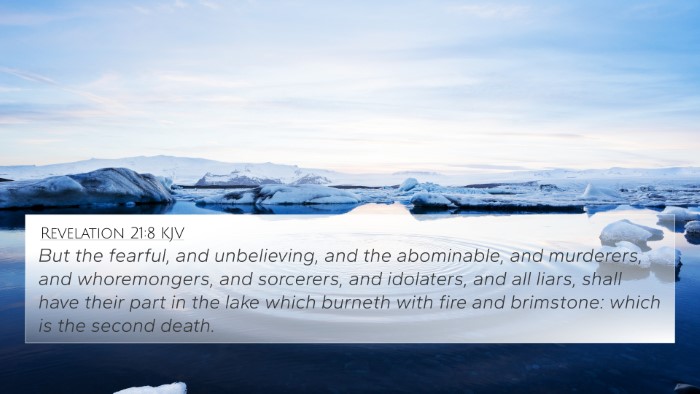Understanding Matthew 26:70
Verse: "But he denied it before them all, saying, I know not what thou sayest." (Matthew 26:70)
This verse depicts Peter's denial of Jesus, serving as a profound moment in the narrative of the crucifixion and the trials faced by Jesus’ disciples. Various public domain commentaries provide insights into its significance within the Biblical context.
Commentary Insights
Matthew Henry's Commentary
Matthew Henry points out that Peter’s denial illustrates the weakness of human resolve in times of fear and pressure. Despite having declared his loyalty earlier, the circumstances around Jesus' arrest caused him to act contrary to his convictions. This highlights the theme of fear leading to failure in faith, a reminder of the fragility of human strength.
Albert Barnes' Notes on the Bible
Barnes notes that this moment of denial can be seen as both a literal and metaphorical turning point in Peter’s journey. It underscores the idea that even the most devoted followers may falter under duress. This incident foreshadows Peter's later restoration, symbolizing redemption and forgiveness after failure.
Adam Clarke's Commentary
Clarke emphasizes the context, explaining that Peter’s denial is not just a personal failure but part of a larger narrative involving prophecy. He references the prediction made by Jesus in Matthew 26:34, where Jesus foretells Peter's denial. This connection illustrates the fulfillment of prophecy and adds depth to Peter's actions.
Connections between Bible Verses
Matthew 26:70 relates to numerous other scriptures that provide further understanding and context. Here are some notable cross-references:
- Matthew 26:34: Jesus foretells Peter's denial, which adds prophetic context to his actions.
- John 18:17: Another account of Peter's denial, highlighting the continuity between Gospel narratives.
- Mark 14:68: A parallel account that illustrates Peter's responses under pressure.
- Luke 22:57: This verse provides further insight into Peter's circumstances during the denial.
- 1 Corinthians 10:12: Paul warns that those who think they stand should take heed lest they fall, connecting to Peter's overconfidence.
- John 21:15-19: This offers a redemption narrative where Peter is restored by Jesus after his denial.
- Isaiah 53:3: This prophecy about Jesus as despised and rejected relates to the atmosphere surrounding Peter's denial.
Thematic Connections
Several themes emerge when examining Matthew 26:70 in conjunction with these other verses:
- Human Weakness: The tendency for individuals, including devoted followers, to falter under pressure.
- Fulfillment of Prophecy: The connection between Jesus' predictions and the events that unfold, reinforcing the divine plan.
- Redemption and Forgiveness: Peter’s restoration serves as a vital theme of grace and reconciliation, echoing throughout the New Testament.
- Fear vs. Faith: The struggle to maintain faith in the face of fear is a central theme illustrated by Peter’s denial.
- Transformation: The journey from denial to restoration is pivotal in understanding Peter's role in the early Church.
Tools for Bible Cross-Referencing
To explore the connections and themes further, consider employing the following tools:
- Bible Concordance: A helpful resource for finding related verses and themes.
- Bible Cross-Reference Guide: A systematic tool to link scriptures together.
- Cross-Reference Bible Study: Engaging in this study method enhances understanding of inter-Biblical dialogues.
- Bible Reference Resources: Websites and apps dedicated to providing comprehensive cross-references.
Long-Tail Keyword Strategies
For those seeking deeper insights, employing long-tail keywords can enhance research. Here are some examples:
- How to find cross-references in the Bible: A practical inquiry into methods for identifying related verses.
- Identifying connections between Old and New Testament: Understanding the continuity and cohesiveness of Biblical themes.
- Cross-referenced themes in the Bible: An exploration of thematic links across various scripture passages.
Understanding User Intent
Recognizing what users seek when exploring Bible verses enhances relevance. Common queries might include:
- What verses are related to Matthew 26:70: A search for connections that illuminate its meaning.
- Similarities between Peter’s denial and other disciples’ failures: An exploration of collective human frailty.
- Bible verses that support the theme of redemption: Identifying scriptures that align with Peter’s journey.
Conclusion
Matthew 26:70 not only represents a critical moment in the life of Peter but also serves as a rich subject for exploration through cross-referencing. By examining related scriptures, themes, and interpretations from respected commentaries, one gains a fuller understanding of its implications in the narrative of faith and human experience.
















